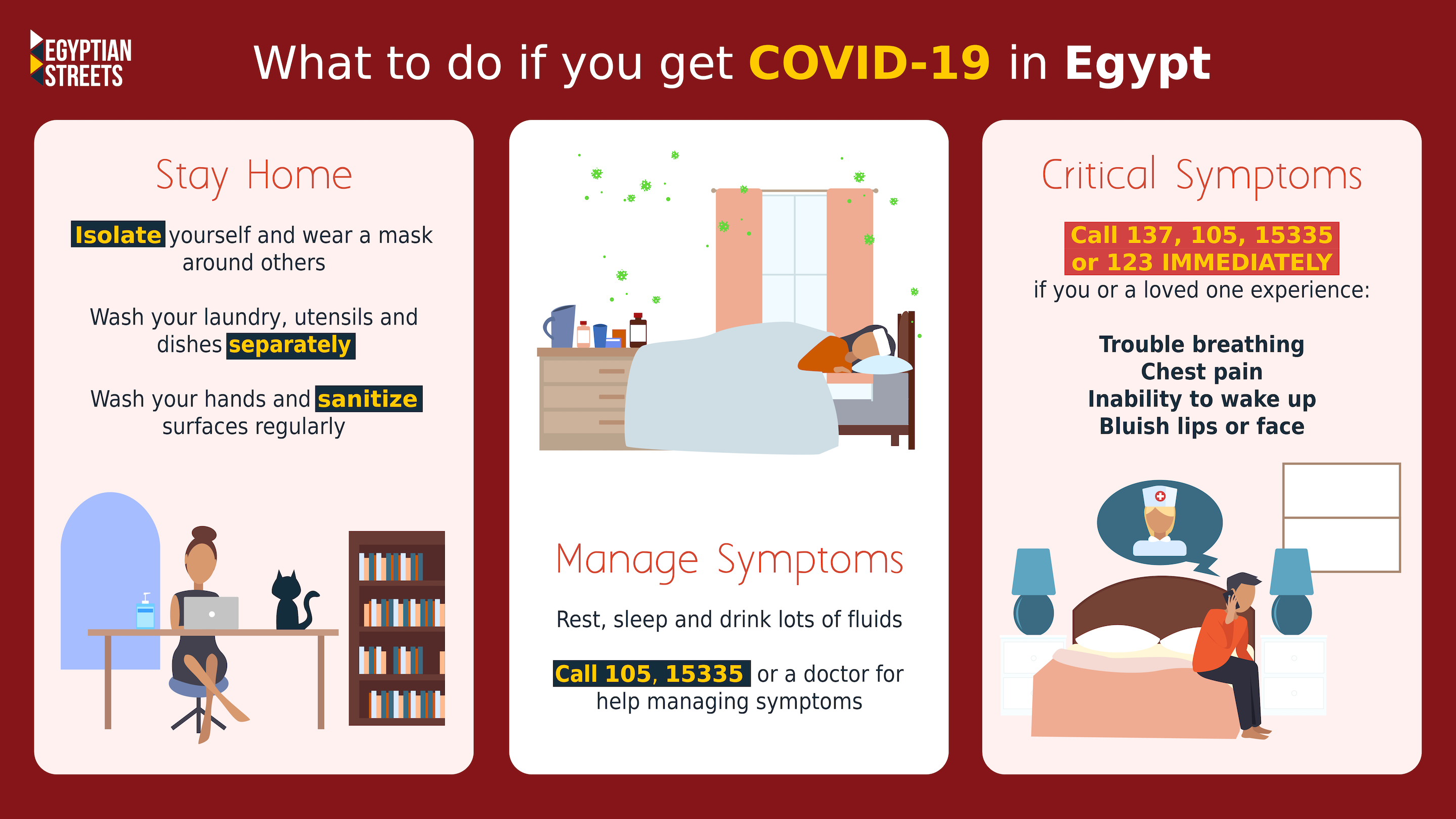With the coronavirus pandemic sweeping through the world’s nations, every household is on high alert. As with all diseases, prevention is better than cure, but the good news is, most COVID-19 cases are mild and the chances of getting infected are relatively low in most places, according to the World Health Organization (WHO).
However, due to the virus’ unrelenting spread, individual actions can have a significant impact on the management of the health crisis on a national level. Many public health agencies around the world, including WHO and Egypt’s Ministry of Health and Population are recommending that people be prepared with a plan of action in case they develop any COVID-19 symptoms.
Identify Your Symptoms
According to WHO, the most common symptoms of COVID-19 are “fever, tiredness, and dry cough.” Less common symptoms include “aches and pains, nasal congestion, runny nose, sore throat or diarrhea.” However, it is important to note that many coronavirus carriers don’t show symptoms.
In some cases, coronavirus patients could also develop loss of taste and smell, a team of researchers at King’s College London found.
These symptoms often develop gradually and are mild in most cases, however one in every six coronavirus patients suffer life-threatening complications.
These at-risk populations include senior citizens and individuals with underlying conditions, such as diabetes, chronic respiratory illnesses, cardiovascular, liver and kidney diseases. At-risk population also includes individuals whose immunity might be compromised.
According to the Center for Disease Control (CDC), “many conditions can cause a person to be immunocompromised, including cancer treatment, smoking, bone marrow or organ transplantation, immune deficiencies, poorly controlled HIV or AIDS, and prolonged use of corticosteroids and other immune weakening medications.”
If you need help identifying your symptoms, you can refer to Vezeeta’s free symptom checker.
Stay Home and Self-Isolate
Due to the anticipated rise in COVID-19 case numbers across Egypt, it is paramount to support healthcare workers in their mission to treat coronavirus patients who develop life-threatening complications, and the best way to do that is to slow the spread of the disease and flatten the curve.
According to experts, 50 percent of coronavirus carriers are asymptomatic, which is why we are all advised to stay home, maintain social distance, sneeze and cough in a tissue, and sanitize our hands as well as frequently touched surfaces regularly regardless of whether or not we show symptoms.
If you suspect that you might have COVID-19, you must self-isolate. If you share living quarters with others, isolate yourself in your room, warn them that you may have COVID-19 and avoid contact with them.
The CDC and Egypt’s Ministry of Health recommend doing your laundry and washing your dishes and utensils separately, and, if possible, using your own bathroom. If a separate bathroom can’t be made available to you, sanitize the shared bathroom after each use and keep your personal effects, such as toothbrushes or razors, away from those of other household members.
You should also follow the general hygiene guidelines specified by public health agencies, such as washing your hands frequently for at least 20 seconds and sanitizing light switches, door knobs, mobile phones, remote control devices, laptops, countertops, tables, and any other frequently touched surfaces.
If you must go out, wear a face mask, sanitize your hands and any surfaces you touch, avoid public transportation and maintain a social distance of at least two meters from others.
Manage Symptoms
Most COVID-19 cases are mild and therefore easily manageable at home. Individuals over 65 years of age and those who suffer from underlying conditions, such as heart disease, diabetes, or respiratory illness or those who are otherwise immunocompromised are more likely to develop serious complications from coronavirus.
All potential coronavirus patients and carriers in Egypt are strongly advised to notify the Ministry of Health and Population by calling 105 or 15335 for specific instructions on how to proceed or manage the disease depending on the severity of their symptoms and medical history.
In most cases however, patients can alleviate mild symptoms through rest, sleep and fluid intake. Both the CDC and WHO recommend that all patients contact their doctor or GP as soon as they develop symptoms for specific instructions on how to manage symptoms, regardless of their severity.
Your doctor might recommend over the counter pain relievers or cough medication. If you can’t access a healthcare professional over the phone, you can find one through healthcare apps such as 7Keema, Pashakeem or Vezeeta, which are offering free medical services for those managing COVID-19 symptoms from home—using the promo code “One4All”—and are available for Android and Apple phones.
Critical Symptoms to Watch out for
Health experts recommend that patients alert their healthcare provider and seek emergency medical assistance if they develop any of the following symptoms: “trouble breathing, persistent pain or pressure in the chest, new confusion or inability to arouse, bluish lips or face,” according to the CDC.
Call 137, 105, 15335 or 123 immediately if you or a loved one develop any of the above symptoms.








Comments (0)